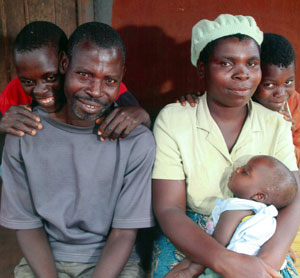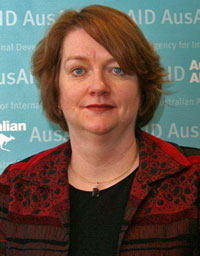Australia Africa Community Engagement Scheme (AACES) at a glance
This is the inaugural annual report for the Australia Africa Community Engagement Scheme (AACES). The $90 million program is funded by the Australian Government through the Australian Agency for International Development (AusAID).
AACES is a partnership of AusAID, 10 Australian Non- Government Organisations (NGOs) and their Africa-based partners. It contributes to the AusAID strategy for Africa through community-based interventions across the sectors of food security, maternal and child health and water, sanitation and hygiene. The program focuses on marginalised communities, with particular attention to women, children, people with disability and people vulnerable to disaster.
AACES is the largest AusAID funded NGO program in Africa and will be implemented over five years (2011–16) in 11 countries, namely: Ethiopia, Ghana, Kenya, Malawi, Mozambique, Rwanda, South Africa, Tanzania, Uganda, Zambia and Zimbabwe.
Our objectives
AACES has three objectives:
- Objective 1: to give marginalised people sustainable access to the services they require
- Objective 2: to strengthen AusAID policies and programs in Africa, particularly in their ability to target and serve the needs of marginalised people
- Objective 3: to better inform the Australian public about development issues in Africa
Our approach
Fortunate Dzonzi with her husband and three of their children. Fortunate recently joined a village savings and loans program in Dowa District, Malawi. In less than three months, Fortunate took out her first savings loan to buy chemicals to remove weeds from her farm. She hopes this will result in more food for her family and maybe even a little extra to sell at the local market. Photo by Josh Estey/CARE
Partnership is an overarching principle of AACES and is critical for the success of the program. This includes partnerships at several levels: among the NGOs in Australia and Africa, between Australian NGOs and their African partner NGOs, and between the NGOs and AusAID. Beyond these are other important partnerships–for instance, between African NGOs and the communities in which they work, between African NGOs and their government counterparts, and between communities and their governments.
Community empowerment is important for marginalised groups to reach their full potential. AACES programs build on existing assets, strengths and resources of communities and support them to be the architects of their own development aspirations.
Learning is central to the AACES approach in order to inform ongoing improvements to program results, efficiency and effectiveness. To encourage this, the program takes a flexible approach with annual planning and has a number of mechanisms for sharing information.
Innovation is encouraged as an important learning element in the program and is supported by an Innovations Fund. The Fund supports collaboration in creating new models and approaches that can have catalytic effects and provide benefits to other programs beyond AACES.
Value for money is an increasingly important consideration in determining the effectiveness and efficiency of the program. A Value for Money assessment is being undertaken and assessments will be made at the mid-point and end of the program. The AACES approach to Value for Money is guided by the core principles of balancing economy, efficiency and effectiveness in ways that are both equitable and ethical.
Joint AusAID/NGO management of the program is achieved through the Program Steering Committee (PSC), the central decision-making body of the program. Its membership includes representatives of Australian NGOs and their Africa-based partners and AusAID. The positions of Chair and Vice-Chair rotate among the members on an annual basis.
A resource facility managed by the African Capacity Building Foundation, provides logistical, administrative and technical services to the program to support effective communication, coordination and management of program activities. The PSC approves the annual work plan of the resource facility and oversees its activities.
Messages
From the Chair of the Program Steering Committee (PSC)
Phillip Walker
The year 2011–12 was indeed a defining year for AACES, as program implementation began and we moved from the program design phase to putting into practice projects in the various communities across Africa.
As the Chair of the PSC, I had the privilege to witness the cementing of a sincere partnership between the people of Australia and Africa. AACES is built on almost five decades of collaboration between the Australian NGO sector and African organisations and communities, which has produced mutual respect and knowledge, along with fruitful benefits and gains for all involved. Besides contributing to Africa's ongoing socio-economic development, we saw AACES making valuable inputs to the evolving policy environment as lessons are learnt, analysed and shared. In its initial stages we also see how the program is already educating Australians on the benefits of good global citizenship, the commonalities we have as humans, and the diversity of the African continent.
As the PSC Chair, I have seen how in its first year AACES has provided compelling evidence of the ability of civil society to work together to ensure the active involvement of the key beneficiaries–women and children–as they strive to achieve their aspirations. Already, we are pleased that tangible change has become apparent in AACES operational areas. This, the first annual report in a five-year program, is a record of the progress to date.
Phillip Walker
Chairperson, Program Steering Committee, 2012–13
From AusAID
Margaret McKinnon
AACES is an innovative approach to working with civil society organisations. It is not a typical grant/donor relationship. AACES is a partnership agreement where all parties listen to, share with and support one another to improve development outcomes in Africa.
AACES values the existing relationships built by the NGOs and AusAID across Africa and the different approaches each NGO brings to the program, including strengths or rights based approaches, integrated approaches that address various sectors in recognition that development issues are not isolated to any one individual issue, and single sector focused approaches that target the greatest development need. The work undertaken in the first year of implementation has demonstrated commitment, innovation and sustainability beyond the life of the program in order to save lives under the three key sectors: food security, maternal and child health and water, sanitation and hygiene, across 11 countries in Africa.
Effective support for civil society needs to go beyond funding service delivery to include support for engagement in policy dialogue and holding governments and other stakeholders accountable for the delivery of services to poor and marginalised people.
At the end of the first year of AACES, there has been strong interest from other areas of AusAID in the unique partnership approach. The AACES principles are in line with the recently released AusAID Civil Society Engagement Framework 2012 and AACES has informed the development of other civil society programs. All this goes to demonstrate that AACES contributes to the Agency's focus to deliver an aid program that is transparent, effective and provides real and measurable results in reducing poverty on the ground.
Margaret McKinnon
First Assistant Director General,
AusAID Africa and Community Programs
From a Program Participant
Joseph Ogur
The impact of AACES is demonstrated through an increased demand by previously marginalised groups for their rights and services, as highlighted by Joseph Ogur, a government administration official in Ndhiwa district of Kenya, who said that,
'....community members have become empowered and are able to question issues and demand for their rights and accountability from us as their leaders... for all the years I have served this community, I had never witnessed the vigour and the level of participation and attitude towards change seen now... Truly, it's a real change...'
In the first year of programming, a number of AACES partners adopted a rights-based approach in their interventions. This approach achieved a positive transformation of power relations among communities, especially among the marginalised and vulnerable groups. The program partners in all countries of operation strengthened the capacity of groups who do not usually experience full rights (particularly women and children) to attain their rights, and the ability of local authorities and community leaders to support this objective.




